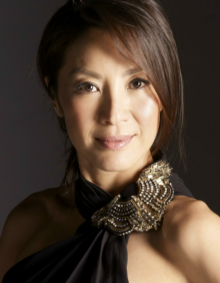An Interview with Michelle Yeoh—Fighting AIDS from the Heart

Michelle Yeoh |
October 2009—Michelle Yeoh is recognized internationally for her work as a film star, action heroine, and humanitarian. Acclaimed for her portrayals of strong female characters and for performing her own stunts in such films as Crouching Tiger, Hidden Dragon, she has long been involved with Asian and global charities, among them amfAR, for which she serves as an ambassador. Yeoh was born in Malaysia of ethnic Chinese parents and is now based in Hong Kong.
TREAT Asia Report: You’ve been involved in the fight against AIDS for many years as a patron of AIDS Concern Hong Kong and as an amfAR ambassador. What convinced you that this issue needed your support?
Michelle Yeoh: I strongly believe in the need to work on behalf of this cause. For women, protecting themselves from HIV/AIDS is a fundamental issue and that convinced me to speak out publicly. I remember when I was first approached to take a public stand against HIV/AIDS—some advised me not to become involved with an issue that was connected with sex and acts that some people felt were shameful. But I was convinced that ignorance and fear can sometimes be more contagious and dangerous than the disease itself.
TA Report: From your perspective, what are the most pressing issues facing Chinese communities, in China and across Asia, when it comes to confronting HIV/AIDS and supporting people living with HIV?
Yeoh: Stigma and discrimination are two of the biggest problems. Families and communities are the heart of Chinese life, but so many times I’ve seen the stigma of HIV/AIDS break those bonds—discrimination by relatives, neighbors rejecting long-time friends.
One of the most heartbreaking things I’ve seen in my work on HIV is the stigma HIV-positive children often face in their communities. When people refuse to let their children play with HIV-positive children, or prevent them from attending public school, then it’s time for all of us to speak out.
Access to treatment is also critical. China is making a strong effort to provide greater access to treatment, but there are many migrant workers both from China and from other countries who have difficulty accessing free HIV care and medicines.
It is also important to provide social support for people living with HIV. HIV can take a serious toll on so many aspects of life. Children who have lost parents to HIV/AIDS or whose parents are ill may need help with education fees. Some people with HIV may be unable to work and must rely on others to help provide for their basic needs. Providing social services can make a significant difference in people’s daily lives.
| “Ignorance and fear can sometimes be more contagious and dangerous than the disease itself.” |
TA Report: As you mentioned, discrimination and stigma against those living with HIV are widespread, in China and around the world. In your experience, what are the most effective ways to address the lack of knowledge that underpins fear and stigma?
Yeoh: Perhaps because I have lived my life in the public eye, I believe that one of the most powerful ways to combat stigma is to speak out publicly about AIDS. A lot of people don’t know the basic facts about prevention, testing, how the virus is transmitted, and why they shouldn’t be afraid of someone with HIV. If we bring the subject out into the open, I hope that people will eventually realize that HIV should not be a mark of shame.
China’s political and economic leaders have acknowledged the impact of HIV on Chinese society and have taken a meaningful leadership role. The government is committed to expanding treatment and some politicians have publicly embraced people with HIV/AIDS. China’s leaders see the epidemic as a human and social development challenge, rather than a moral issue.
Without leadership, it is difficult for a country to make real progress against the stigma associated with HIV/AIDS. We need leadership to combat the discrimination that makes it hard for people to seek treatment if they become infected, hold a job, sustain relationships, and live active lives in their own communities.
TA Report: How important is it for a public figure like yourself to speak out about AIDS?
Yeoh: The media is the quickest and most powerful way to speak out. Those of us who have the attention of the media are privileged, and we have the responsibility to put that privilege to good use! I am fortunate because I can draw public attention to HIV/AIDS and help people understand that this is a disease that can be eradicated. This work cannot stop until we have defeated the epidemic on every front around the world.